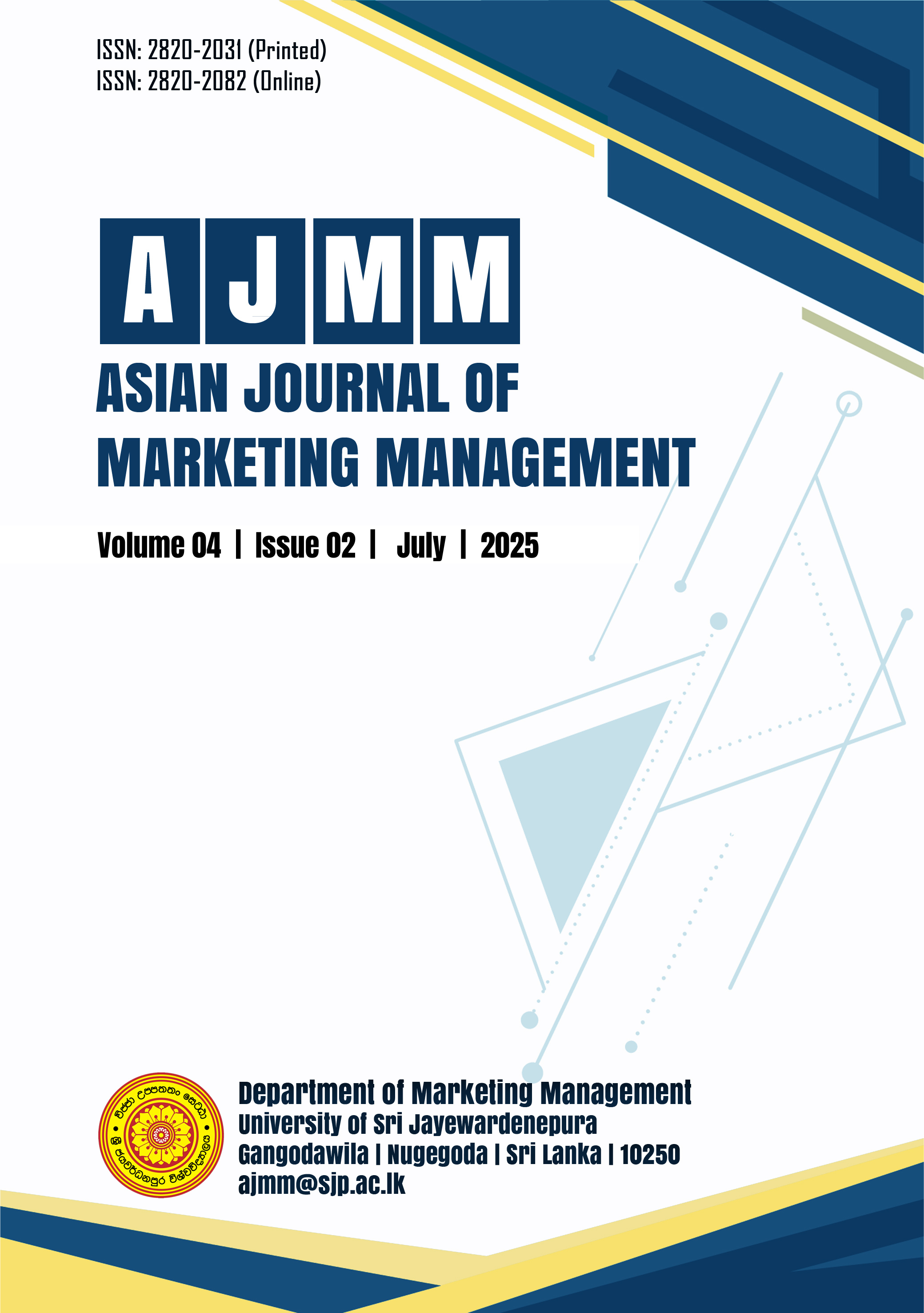Editorial Note
Abstract
The Editorial Board of the Asian Journal of Marketing Management (AJMM), affiliated with the Department of Marketing Management, Faculty of Management Studies and Commerce, University of Sri Jayewardenepura, Sri Lanka, is pleased to present Volume 4, Issue 2. This issue brings together scholarly perspectives that converge on a central theme: the transformation of marketing thought and practice under the forces of digitalisation, consumer reflexivity, and sustainability imperatives, especially within emerging market contexts. Comprising six peer-reviewed research articles, this issue reflects the journal’s mission to disseminate rigorous, contextually relevant scholarship that informs both theoretical advancement and managerial implications in the marketing discipline.
In “A Gift for Me is a Lift for Me,” Somasiri and Hettiarachchi reframe self-gifting not as impulsive indulgence, but as a goal-directed act grounded in Goal Setting Theory. Their findings indicate that self-gifting motives, such as reward and disappointment, interact with purchase decision involvement to shape customer satisfaction, offering fresh theoretical insight into emotionally motivated consumption in collectivist cultures.
Sandamali, Weerakkody, and Sachitra, in “Consumer Response to Sustainable Production Messages on Social Media,” confirm that attitudinal alignment toward sustainability, coupled with digital literacy and platform dependency, significantly impacts green purchasing behaviour. The work bridges the sustainability communication gap in developing markets.
Olamide A.A., in “Fast Fashion’s Sustainability Dilemma,” investigates the dissonance between environmental responsibility and consumer demand. Drawing from extensive empirical data, the paper links brand sustainability performance to consumer loyalty and satisfaction, while also critiquing superficial sustainability efforts (greenwashing) that undermine authentic transformation in the fashion industry.
In “The Influence of AI-Driven Marketing Analytics on Strategic Decision-Making,” Ediriweera, Pramudika, and Fernando investigate how AI adoption in Sri Lankan private educational institutes enhances strategic decision-making. Uniquely, the study integrates organisational culture as a moderator, demonstrating that innovation-oriented cultures facilitate better outcomes in AI-driven marketing strategies.
Abeywickrama et al., in “Brand Experience, Trust & Customer Satisfaction on Brand Loyalty,” examine how brand experience, brand trust, and customer satisfaction drive brand loyalty in Sri Lanka’s apparel sector. The study underscores the critical role of emotional branding in sectors where functional differentiation is minimal, offering actionable insights for retail brand managers.
Finally, “Examining the Influence of Electronic Word of Mouth,” by Lokupathirana and Weerakkody, employs the Information Adoption Model to explore how information quality, credibility, and adoption shape fashion consumers’ purchasing decisions in Sri Lanka’s Western Province. This paper offers timely contributions in a post-pandemic retail environment where digital influence rivals traditional advertising.
Together, the articles in this issue represent a transdisciplinary synthesis of marketing, consumer psychology, technology adoption, and sustainability studies. Future research may extend these inquiries through aspects such as behavioural modelling of consumer reflexivity, longitudinal studies on AI-human collaboration in strategic marketing, cross-cultural analyses of greenwashing perception and sustainability literacy, and deeper investigations at the intersection of digital ethics, trust, and algorithmic personalisation.
We express our sincere appreciation to all contributing authors for their intellectual rigour and to our reviewers for their critical insights. Our gratitude also extends to the language editors and production team for their unwavering support in maintaining AJMM’s academic excellence. We trust that this issue will inform, inspire, and provoke dialogue among scholars, practitioners, and policymakers committed to advancing the marketing field.





